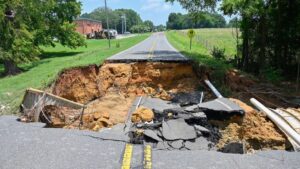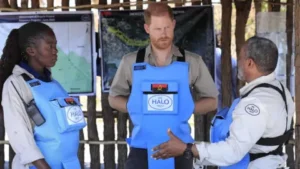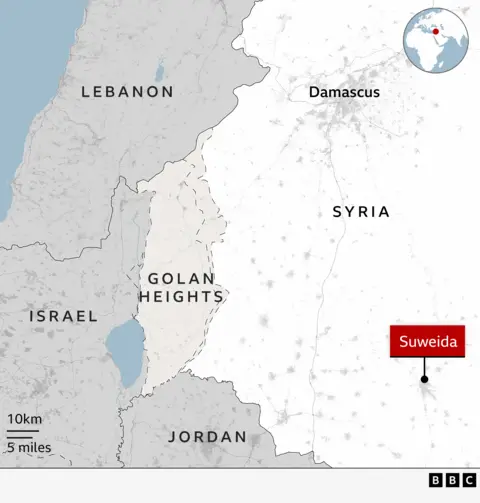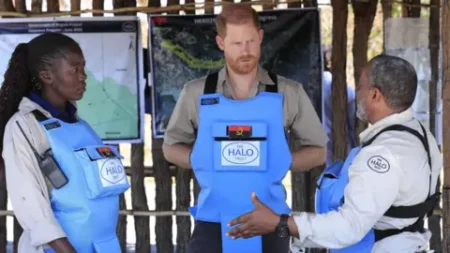The ongoing conflict in Syria continues to escalate, with the latest developments highlighting a volatile situation following Israeli airstrikes that targeted the Syrian military and government strongholds in Damascus. The strikes coincide with severe sectarian violence erupting in Suweida, a province predominantly inhabited by the Druze community. This surge in violence marks a troubling continuation of the humanitarian crisis that has persisted in Syria for over a decade.
On one hand, we witness Israel’s military actions aimed at what Israeli Prime Minister Benjamin Netanyahu describes as “rescuing our Druze brothers” from the Syrian regime’s attempts to suppress them. In stark contrast, the Syrian government has responded with fiery rhetoric, branding Israel’s actions as “treacherous aggression.” The escalations have led to devastating consequences, with reports indicating that over 300 lives have been lost in Suweida since hostilities reignited on Sunday, ignited by a conflict between Druze militias and Bedouin tribes.
Among the key players in the diplomatic arena, U.S. Secretary of State Marco Rubio expressed grave concerns regarding the violence but noted that there had been an agreement to take “specific steps” toward de-escalation that could bring about a ceasefire. Rubio’s assertion was echoed in a post on social media, stating that efforts were in play to conclude the troubling situation in what was termed a critical moment for humanitarian intervention.
The Syrian government expressed appreciation for U.S. and Arab efforts to mediate and resolve the ongoing crisis peacefully, even as Israeli forces continued their campaign against perceived threats in southern Syria. Reports from Syria’s state news agency indicated an ongoing withdrawal of Syrian military troops from Suweida, suggesting a potential agreement forged with local religious leaders to quell the violence. The encouragement for armed groups to retreat may signal an avenue towards a fragile calm or further complications, depending on the underlying tensions.
The intensity of Israel’s military campaign has been outlined through the targeting of Syrian military installations, with strikes reaching critical areas such as the defense ministry in central Damascus. The Israeli military justified these actions as necessary measures against heavy machine weapons that were reportedly en route to bolster the Bedouin forces in Suweida, raising alarms over the potential threats posed to civilian populations trapped in the conflict zone.
In the face of chaos, the humanitarian situation in areas like Suweida has reached critical levels, with severe shortages of medical supplies and mounting casualties presenting an urgent need for aid. Reports from local observers and humanitarian organizations emphasize the deteriorating conditions as calls for ceasefire and military withdrawal buoy hopes for a resolution. However, skepticism lingers among minority communities such as the Druze, who harbor profound mistrust towards Assad’s interim government, despite promises to safeguard their rights and security.
Meanwhile, the Israeli government remains adamant about its commitment to protect the Druze minority in Syria, partly due to their connections to Druze individuals in Israel and the Golan Heights. Defense Minister Israel Katz reiterated this stance, conveying a message of continued military readiness to thwart any aggression that could exacerbate the situation.
The sequence of events now unfolds in a somber backdrop of sectarian conflict which has only exacerbated the long-standing scars of civil war in Syria. Clashes initiated over the recent abduction of a Druze merchant have underscored the fragility of peace in a region riddled with historical grievances and tribal allegiances. As factions vie for power and control amid the devastation of war, the pain of the Syrian populace only intensifies.
In conclusion, these compounded tragedies highlight an urgent call for sustained international dialogue and mediation efforts. The path forward remains tangled in complexity, marked by shifts in political allegiances and the intricate dance of military strategy. Ensuring the safety of civilians caught in the crossfire and restoring a semblance of stability in this tumultuous region requires an unwavering commitment to collaborative peacebuilding efforts and a humanitarian response to alleviate the suffering of those affected.











